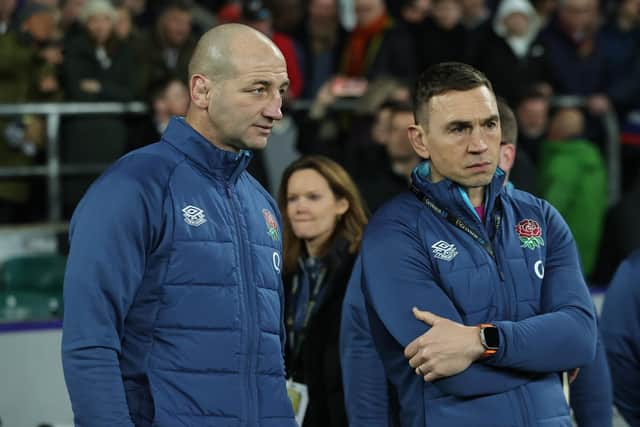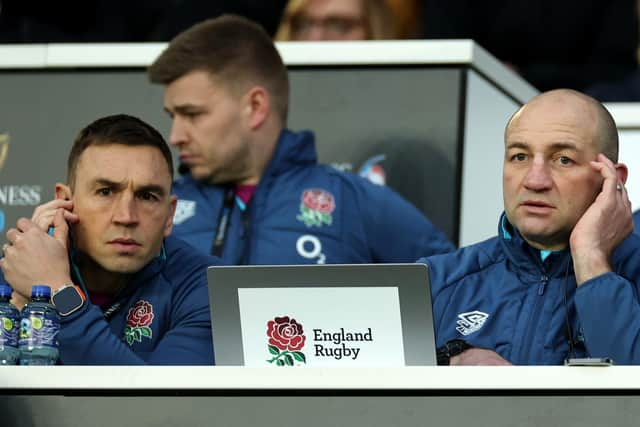Steve Borthwick and Kevin Sinfield need time to implement England changes, says Rob Vickerman
Scotland won the Calcutta Cup for a third successive year on Saturday, defeating England 29-23 at Twickenham to spoil the Borthwick party.
The former England captain who succeeded Eddie Jones in December, admitted in the wake of the defeat that there is a lot of work to do, especially given there is a World Cup in just seven matches time.
Advertisement
Hide AdAdvertisement
Hide Ad“Some areas didn’t go so well and we need to make sure we get those addressed,” said Borthwick on Saturday evening.


“We are trying to rebuild the set-piece here. That takes time. Some take longer than others.”
For Vickerman, the former Yorkshire Carnegie and England Sevens captain, who is now a leading pundit on the international Sevens game, Borthwick and his new defence coach Kevin Sinfield need to be given time to make their adjustments.
"It’s a really difficult period for new coaches because they’ve got to put their style across knowing that any type of change can bring about problems that might not result in success,” Vickerman told The Yorkshire Post.
Advertisement
Hide AdAdvertisement
Hide Ad“And they’re going to be judged instantly by a public that is expecting something different.


“So there’s that added pressure to not necessarily completely reform, because you need that level of performance and success to put everybody else off your scent a bit.
"But that brings with it a degree of fear from the wider English public.”
Yet Vickerman sees in what Borthwick and Sinfield achieved in a short amount of time at Leicester Tigers – transforming a struggling club into Premiership winners – as an encouraging blueprint.
Advertisement
Hide AdAdvertisement
Hide Ad"If you watched Leicester the last 18 months they had a system and a structure that adapts to their players and plays to their strengths,” says Vickerman.


"It’s a very different proposition when you try and replicate that with people who have different systems, structures and understanding of the game.
"But Kev is meticulous, add to that Borthwick’s attention to detail and I think those two coaches have the right recipe to balance that short-term success factor with a longer-term development pathway.”
Next up for England is Italy at home on Sunday, traditionally the easier of the Six Nations appointments, although the Azzurri gave champions France a fright in Rome on Sunday.
Advertisement
Hide AdAdvertisement
Hide AdThe bigger picture of course is the World Cup in France in September.


And for all that England scream a team in transition right now, Vickerman believes the short run-up for Borthwick might not be a bad thing, especially with the amount of time they’ll have to work with their players over the coming weeks, and in the summer.
"They’ve got five Six Nations games and three summer Tests in all and then it’s the World Cup, so they’re looking at single-digit amount of games to go before the World Cup,” says Vickerman.
"It’s not practical for anyone, but Wales have changed (Warren Gatland), Vern Cotter has just gone from Fiji, so these teams are aware these tournaments are a last chance saloon to build that momentum, confidence and faith.
Advertisement
Hide AdAdvertisement
Hide Ad"The player agreements mean England’s players will actually be together more in the next six months than they probably have been at any time over the last three years – which is a positive one.
“Looking at the Leicester model, that Borthwick and Sinfield duo brought almost instant success and they maintained it for a year.
"Ok, there’s been a few questions asked, probably wider in the Premiership, about unravelling Leicester’s plan which some teams have shown that you can do.
"But it might fit quite well to have short-term success with their methodology knowing it might be a different scenario going forward after the World Cup.”
Advertisement
Hide AdAdvertisement
Hide AdEngland will need a new scrum coach for the World Cup, after it was announced on Tuesday that Richard Cockerill will be stepping down from that position within England’s set-up to take charge of Montpellier’s forwards once the Guinness Six Nations has been completed.
Cockerill is the only coaching survivor from the Jones era after Matt Proudfoot, Brett Hodgson and Martin Gleeson departed in the wake of the Australian’s sacking in December. The former Leicester and Edinburgh boss was retained by Steve Borthwick but his duties were reduced from being in overall charge of the pack to overseeing the revival of the worst performing scrum of any tier one nation in 2022.
Cockerill was recruited by Jones in September 2021 and served a brief spell as interim head coach until Borthwick was appointed. Cockerill said: “It is disappointing not to work with Steve beyond the Six Nations. I had hoped to be able to stay for the World Cup, but the timings weren’t meant to be.”